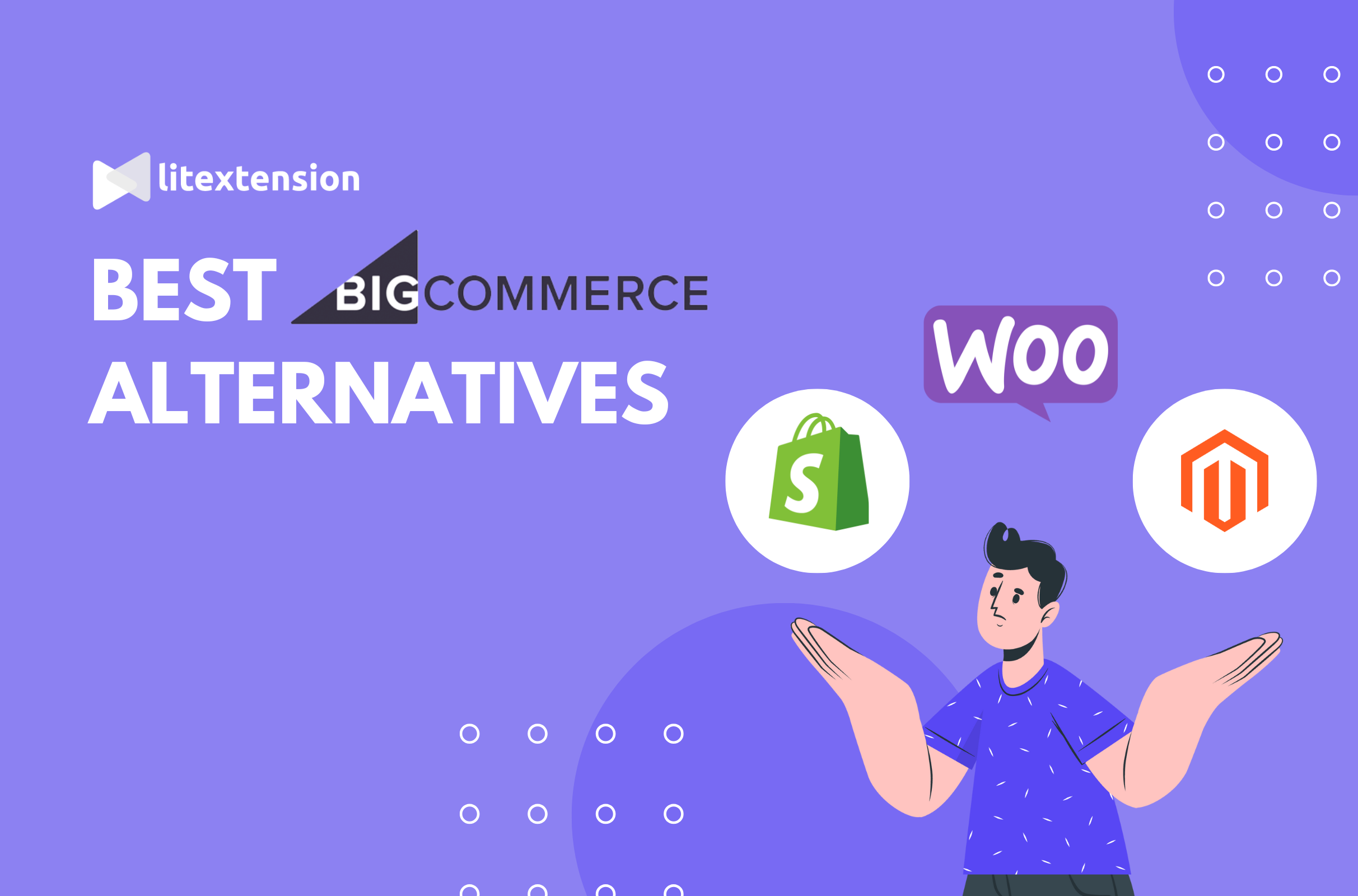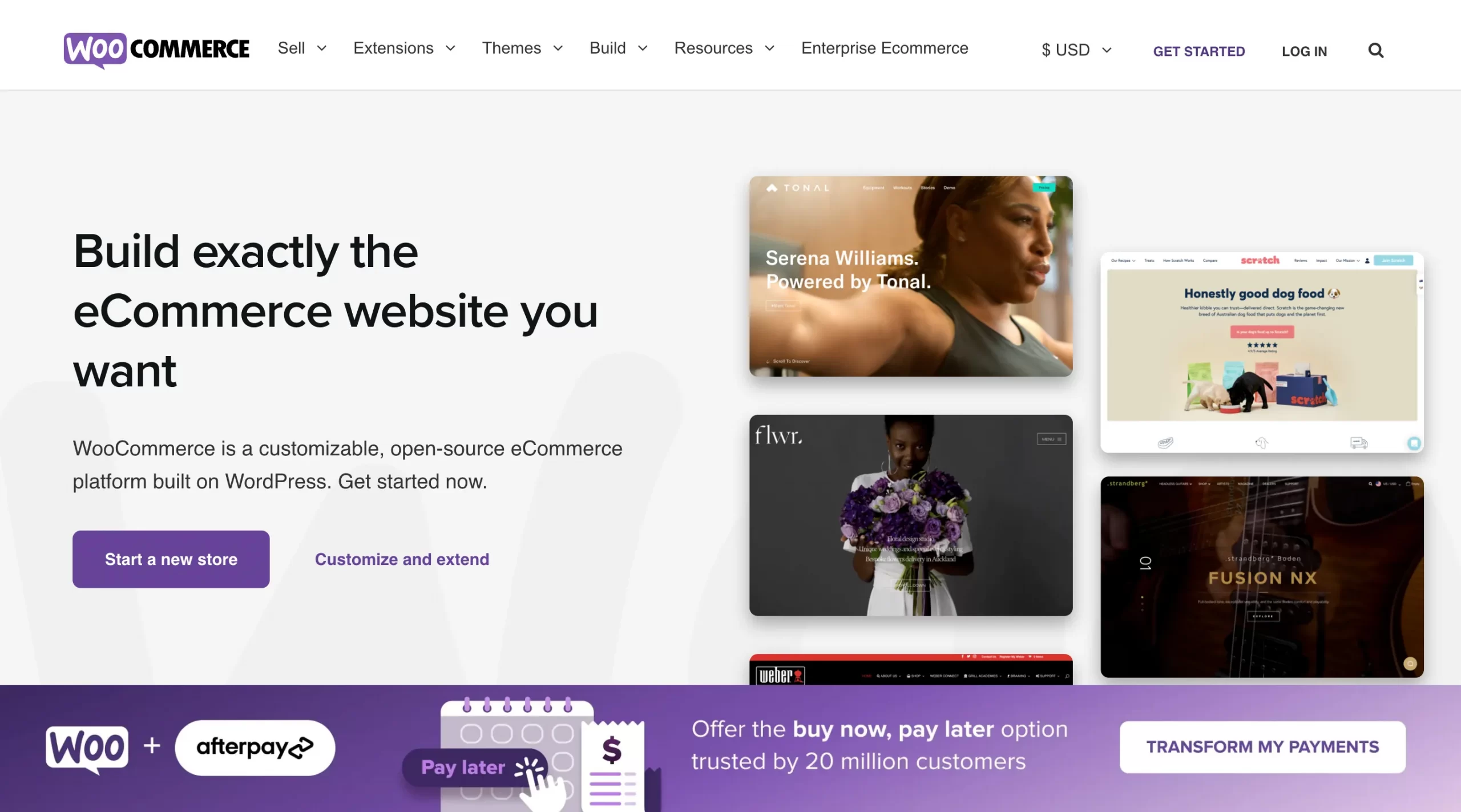Are you in search of Bigcommerce alternatives to take your e-commerce business to new heights? Look no further! In this article, we will explore the top 10 platforms that can help you achieve e-commerce success. Whether you’re considering Shopify, WooCommerce, Magento, or other popular options, we have got you covered. Let’s dive in and discover the perfect Bigcommerce alternative that suits your business needs and boosts your online presence.
Choosing the right eCommerce platform can significantly impact your business’s success. Shopify is known for its user-friendly interface and extensive app store, making it ideal for beginners. WooCommerce, a WordPress plugin, provides seamless integration for those already familiar with the CMS, offering extensive customization.
Shopify, WooCommerce, and Magento are popular BigCommerce alternatives. These platforms offer robust features and flexibility for online businesses.
Magento caters to larger businesses with complex needs, providing powerful tools and scalability. Each platform offers unique benefits tailored to different business sizes and technical expertise levels. Evaluating your specific requirements and long-term goals is crucial to finding the best fit. Explore these alternatives to make an informed decision for your eCommerce journey.

Credit: www.shopify.com
Top 10 Bigcommerce Alternative Platforms
Shopify
Finding the right eCommerce platform can be challenging. If you’re considering Bigcommerce alternatives, one popular option is Shopify. This user-friendly platform offers a range of features designed to help businesses create, manage, and scale their online stores.
Features
Shopify stands out with its robust set of features. These functionalities can help you build a successful online store.
- Ease of Use: Shopify offers an intuitive drag-and-drop interface. You don’t need to know coding to set up your store.
- Customizable Templates: It provides a variety of professionally designed templates. These can be customized to fit your brand’s style.
- Mobile Optimization: All Shopify themes are mobile responsive. This ensures your store looks great on any device.
- App Integrations: Shopify boasts a vast app store. You can integrate tools for marketing, shipping, and inventory management.
- SEO Tools: Built-in SEO features help improve your store’s visibility. You can edit meta tags, alt texts, and URLs easily.
- 24/7 Support: Shopify offers round-the-clock customer support. Help is available via live chat, phone, and email.
Pricing
Shopify offers multiple pricing plans to suit different business needs. Each plan comes with its own set of features.
| Plan | Monthly Cost | Features |
|---|---|---|
| Basic Shopify | $29 | All the basics for starting a new business |
| Shopify | $79 | Advanced features for scaling your business |
| Advanced Shopify | $299 | All the tools needed for scaling your business |
Each plan includes a free SSL certificate, web hosting, and unlimited products. Shopify also offers a 14-day free trial. This lets you explore its features before committing.
Pros And Cons
Every platform has its strengths and weaknesses. Here’s a breakdown of Shopify’s pros and cons. Pros
- User-Friendly: Shopify’s interface is straightforward. Beginners can set up their stores without hassle.
- Scalability: The platform grows with your business. You can easily upgrade to higher plans as you scale.
- Extensive App Store: Shopify’s app store offers thousands of integrations. These enhance your store’s functionality.
- Security: Shopify includes a free SSL certificate. This ensures your store is secure and builds customer trust.
Cons
- Transaction Fees: Shopify charges transaction fees unless you use Shopify Payments.
- Theme Costs: Premium themes can be expensive. Customizing your store might require additional investment.
- Advanced Features: Some advanced features are only available in higher-tier plans. This might be a limitation for small businesses.
Understanding these pros and cons can help you decide if Shopify is the right fit for your business needs.

Credit: litextension.com
Woocommerce
Bigcommerce is a popular choice for many e-commerce businesses, but it’s not the only option. One of the most flexible and widely used alternatives is WooCommerce. This open-source plugin for WordPress allows you to transform your website into a fully functional online store. It’s highly customizable and offers a range of features to help you create a unique shopping experience for your customers.
Features
WooCommerce boasts a plethora of features that make it a top contender in the e-commerce space:
- Customizable Storefront: WooCommerce allows you to personalize your store with various themes and plugins.
- Product Management: Easily manage your inventory, add product variations, and set up categories.
- Payment Gateways: Supports multiple payment options, including PayPal, Stripe, and more.
- Shipping Options: Configure shipping methods, rates, and zones to suit your needs.
- SEO Friendly: WooCommerce is built on WordPress, which is known for its SEO capabilities.
These features make WooCommerce a versatile and powerful tool for any e-commerce business. It integrates seamlessly with WordPress, providing a robust platform for your online store.
Pricing
WooCommerce itself is free to download and use, but there are costs associated with running a WooCommerce store:
- Hosting: You need to pay for a hosting provider. Costs can range from $3 to $30 per month, depending on your needs.
- Domain Name: A domain name typically costs around $10 to $15 per year.
- Themes and Plugins: While many themes and plugins are free, premium options can cost anywhere from $20 to $100 or more.
- SSL Certificate: Essential for security, an SSL certificate can cost between $10 to $100 per year.
Overall, the pricing can vary greatly depending on the specific needs and scale of your online store. It’s important to factor in these costs when planning your budget.
Pros And Cons
Like any platform, WooCommerce has its advantages and disadvantages:
| Pros | Cons |
|---|---|
|
|
Despite these challenges, WooCommerce remains a popular choice for many e-commerce businesses, offering a level of flexibility and control that’s hard to match.
Magento
Bigcommerce is a leading e-commerce platform, but several alternatives like Magento offer unique features and benefits. Magento, an open-source e-commerce platform, is renowned for its flexibility, scalability, and robust features, making it a popular choice for businesses seeking a customizable solution.
Features
Magento offers a comprehensive set of features designed to enhance the e-commerce experience. Some of the key features include:
- Customizable Themes: Magento provides a wide range of customizable themes to match your brand’s identity.
- Product Management: Easily manage products with advanced inventory management, product attributes, and categories.
- SEO Optimization: Built-in SEO tools help improve your store’s visibility in search engines.
- Mobile-Friendly: Responsive design ensures your store looks great on all devices.
- Third-Party Integrations: Seamlessly integrate with various third-party applications and services.
- Security: Robust security features protect your store and customer data.
- Multi-Store Management: Manage multiple stores from a single admin panel.
Pricing
Magento pricing varies depending on the edition and specific needs of your business:
- Magento Open Source: Free to download and use. Ideal for small businesses with technical expertise.
- Magento Commerce: Starts at approximately $22,000 per year. Suitable for growing businesses needing advanced features and support.
- Magento Commerce Cloud: Starts at around $40,000 per year. Includes cloud hosting and additional enterprise-level features.
Magento also incurs costs for web hosting, domain registration, and extensions. Custom development and maintenance can increase overall costs.
Pros And Cons
Magento has several advantages and disadvantages:
| Pros | Cons |
|---|---|
|
|
Volusion
Looking for Bigcommerce alternatives? Volusion could be an excellent choice. This e-commerce platform offers a range of features tailored for small to medium-sized businesses. Let’s dive into what makes Volusion a strong contender.
Features
Volusion boasts a comprehensive set of features to help businesses grow. Here’s what you get:
- Store Builder: The drag-and-drop builder makes it easy to create a professional-looking store.
- Responsive Themes: Choose from a variety of mobile-friendly themes that look great on any device.
- Payment Processing: Accept payments through major credit cards, PayPal, and other gateways.
- SEO Tools: Built-in SEO features help you rank higher on search engines.
- Inventory Management: Keep track of stock levels and manage your inventory with ease.
- Security: SSL certificates and secure checkout options ensure customer data is protected.
Volusion also offers advanced analytics to track your store’s performance. You can integrate social media and marketing tools to boost your online presence. Overall, these features make Volusion a robust platform for e-commerce.
Pricing
Volusion offers multiple pricing plans to fit different business needs:
| Plan | Monthly Cost | Sales Limit |
|---|---|---|
| Personal | $29 | $50,000 annually |
| Professional | $79 | $100,000 annually |
| Business | $299 | $500,000 annually |
Each plan includes essential features like unlimited bandwidth, secure checkout, and 24/7 customer support. The higher-tier plans offer additional perks like priority support and more advanced tools. Businesses can choose the plan that best suits their growth stage and budget.
Pros And Cons
Volusion has its advantages and disadvantages, which you should consider:
-
- Pros:
- Easy to use with a drag-and-drop builder.
- Responsive themes that work on any device.
- Comprehensive SEO tools for better search engine ranking.
- Strong security features including SSL certificates.
- 24/7 customer support to help you anytime.
- Cons:
- Limited customization options compared to competitors.
- Sales limits on each plan can be restrictive for growing businesses.
- Some users find the interface slightly outdated.
- Additional transaction fees may apply depending on the payment gateway.
- Pros:
Volusion offers a balance of ease-of-use and functionality. The platform is ideal for small to medium-sized businesses. Make sure to weigh these pros and cons to determine if Volusion meets your e-commerce needs. “`
3dcart
When searching for Bigcommerce alternatives, 3dcart often stands out as a robust option. Known for its versatility and user-friendly interface, 3dcart provides numerous features suitable for various types of eCommerce businesses. Let’s dive deeper into what 3dcart has to offer.
Features
3dcart offers a wide array of features that cater to both beginners and experienced eCommerce store owners. Here are some of the key features:
- Customizable Templates: Choose from over 100 free and premium templates to make your store visually appealing.
- SEO Tools: Built-in SEO tools help improve your store’s search engine ranking, bringing more organic traffic.
- Payment Gateways: Supports over 200 payment gateways, giving you flexibility in how you receive payments.
- Inventory Management: Advanced inventory management features keep track of your stock in real-time.
- Mobile Optimization: All templates are mobile-friendly, ensuring a seamless shopping experience on all devices.
- Customer Management: Tools for managing customer relationships, including CRM and email marketing integrations.
- Product Options: Easily manage multiple product options like size, color, and material.
- 24/7 Support: Get round-the-clock support through live chat, phone, or email.
These features make 3dcart a comprehensive platform for setting up and managing your online store.
Pricing
3dcart offers a variety of pricing plans to suit different business needs. Here’s a breakdown of their pricing:
| Plan | Monthly Cost | Features |
|---|---|---|
| Startup Store | $19 | Basic features, suitable for small businesses |
| Basic Store | $29 | More advanced features, including SEO tools and more templates |
| Plus Store | $79 | Advanced marketing tools and higher support priority |
| Power Store | $129 | Advanced features for larger businesses, including CRM integration |
| Pro Store | $229 | All features with the highest level of support and customization |
With multiple plans, 3dcart provides options for businesses of all sizes. Each plan includes a 15-day free trial, allowing you to test the platform before committing.
Pros And Cons
Like any platform, 3dcart has its strengths and weaknesses. Here’s a quick overview: Pros:
- Customizability: Highly customizable templates and features.
- SEO Tools: Excellent built-in SEO tools to boost your search rankings.
- Payment Options: Supports over 200 payment gateways.
- Customer Support: 24/7 customer support available via multiple channels.
- Pricing Flexibility: Multiple pricing plans to fit different budgets.
Cons:
- User Interface: Some users find the interface less intuitive compared to competitors.
- Learning Curve: The extensive features might require some time to master.
- Speed: Some users have reported slower page loading times.
- Additional Costs: Some advanced features may require additional costs.
Understanding the pros and cons helps you decide if 3dcart is the right fit for your eCommerce needs.

Credit: litextension.com
Frequently Asked Questions
What Is The Best Alternative To Bigcommerce?
Shopify is the best alternative to BigCommerce. It offers robust features, ease of use, and extensive app integrations. WooCommerce and Magento are also popular choices for flexibility and scalability.
Who Does Bigcommerce Compete With?
BigCommerce competes with Shopify, WooCommerce, Magento, Squarespace, and Wix. These platforms offer similar eCommerce solutions for businesses.
What Are The Drawbacks Of Bigcommerce?
BigCommerce has limited customization options and higher costs for advanced features. It also lacks built-in multi-currency support.
Which One Is Better Shopify Or Bigcommerce?
Shopify is ideal for ease of use and extensive app integrations. BigCommerce offers robust built-in features and scalability. Choose based on your specific needs.
Conclusion
Choosing the right e-commerce platform is crucial for your business growth. BigCommerce alternatives offer diverse features and pricing. Explore these options to find the best fit for your needs. Remember, the right choice can significantly impact your online store’s success.
Invest time in research to make an informed decision.

Abul Hasnat Himel is a seasoned Digital Marketing Expert and currently serves as the Sr. Digital Marketing Executive at topsaasapp.com and bestdigitalshop.com with a deep understanding of SaaS marketing strategies, Himel specializes in driving growth, optimizing campaigns, and delivering impactful results for the platform. His expertise spans SEO, content marketing, paid advertising, and analytics, making him a key player in the digital marketing landscape.


2 thoughts on “Bigcommerce Alternatives: Top 10 Platforms for E-commerce Success”